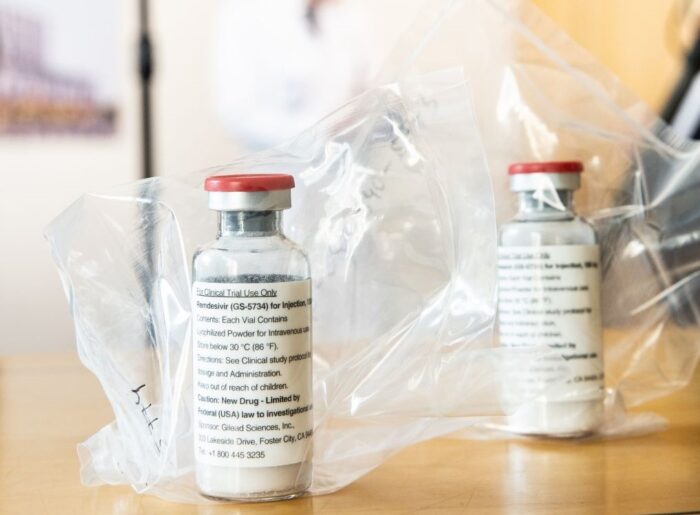
The Gilead Sciences drug remdesivir became the first FDA-approved treatment for Covid-19 based on data from three Phase 3 clinical trials enrolling a little more than 2,000 patients. The company now has new real-world data from 98,654 hospitalized patients that lend additional support for use of the drug.
According to the studies, treatment with the Gilead drug, which the company markets as Veklury, led to a significantly lower risk of death. In two of the studies, patients treated with the drug were more likely to be discharged from the hospital after 28 days. Foster City, California-based Gilead presented the data Monday at the World Microbe Forum.
Veklury is designed to block an enzyme that is key for viral replication. FDA approval of the drug last October covered hospitalized adults as well as children 12 and older weighing at least 40 kilograms (about 88 pounds). The FDA’s review, based on clinical trial results in patients hospitalized with mild-to-severe disease, concluded that the intravenously infused drug’s benefits outweighed risks that include liver toxicity.
FDA’ approval of Veklury came a week after the World Health Organization published preliminary data from a large, four-arm clinical trial in which one of the arms tested the Gilead Sciences drug. The WHO reported that all four arms showed the drugs had little or no effect on death, the start of ventilation, and the duration of hospital stays. The organization added that corticosteroids were the only treatment that have been proven effective against severe and critical Covid-19.
The months since have revealed new understanding about when particular Covid therapies are best suited for use. For antiviral therapies such as Veklury, as well as antibody therapies from Regeneron, Eli Lilly, and partners GlaxoSmithKline and Vir Biotechnology, treatment achieves the best outcomes when given at an earlier stage of the disease.
Gilead presented data from real-world studies, one that analyzed claims data and another that analyzed a database of hospitalized patients. In the claims data analysis, patients had a 23% lower risk of death compared with controls, Gilead reported. In those who completed a full five-day course of treatment with Veklury, patients were more likely to be discharged from the hospital by day 28. The discharge results were most pronounced in patients with lower oxygen requirements at the start of the study—patients who were not at an advanced stage with severe disease.
In the analysis of data from the Premier Healthcare Database, which assessed mortality from August 2020 to November 2020, those treated with the Veklury had a significantly lower risk of death measured at two points, day 14 and day 28, compared with those who did not receive the Gilead drug. When the patients are grouped according to their oxygen requirements, those with no oxygen or low-oxygen requirements continued to show a significant reduction in mortality at day 28. But in those who required high-flow oxygen treatment, those treated with the Gilead drug had significantly lower mortality at day 14, but no statistically significant difference at day 28.
The third real-world study was an open-label Phase 3 clinical trial in hospitalized adults with severe Covid-19. The main goal was to evaluate five-day and 10-day dosing of Veklury. Initial results have been previously reported and published in the New England Journal of Medicine, though that initial research did not include a comparison to a group of patients given the standard of care.
At the World Microbe Forum, Gilead reported results from an analysis assessing those who received Veklury compared to a real-world retrospective study in hospitalized patients who were not treated with the drug. The main goal was to measure the time to death by any cause.
Gilead reported that the analysis found that in the study population, treatment with Veklury was associated with a 54% lower mortality risk at day 28 compared to those who did not receive the drug. That lower risk was not tied to a patient’s oxygen requirements at the start of the analysis. Furthermore, patients who completed a full 10-day course of Veklury had a significantly shorter time to discharge, within the 28 day measurement period, compared with those who did not receive the drug. Gilead reported that the results for the time to discharge were not significant for patients receiving ventilation or ECMO at the start of the analysis.
Photo: Ulrich Perrey/POOL/AFP, via Getty Images










